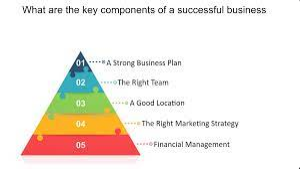
Starting Your Own Business? Get the Scoop on Key Financial Must-Knows
So you want to start your own business, huh? That’s awesome. Being an entrepreneur is challenging but also rewarding. While you’re busy crafting your business plan and figuring out how to build your dream, don’t forget about the numbers.
The financial aspects of launching and running a company are just as critical as your vision and passion. If you don’t have a solid understanding of the key financial elements, your business could be in trouble before you even get started.
This article will give you the inside scoop on the essential financial must-knows for any new business owner. We’ll cover how much capital you need to get up and running, ways to fund your startup costs, key financial statements you need to manage, taxes you’ll have to pay, and how to set financial goals to keep your business thriving. Starting a company is a wild ride, but if you go in with your eyes open to the financial realities, you’ll already be ahead of the game.

Calculate Your Startup Costs
Starting your own business is exciting, but also challenging. One of the first things you need to do is calculate how much it will cost to get your business up and running. These startup costs will determine if your business idea is viable and help you create a financial plan.
Inventory and supplies
Do you need to purchase inventory, raw materials, or supplies to produce your product or service? Make a list of everything you need and get price estimates. Don’t forget things like shipping costs, packaging, and labels.
Equipment
What equipment is essential for your business like computers, tools, machinery, or vehicles? Check prices for purchasing or leasing the equipment you need. You may be able to find good deals on used equipment to lower costs.
Office space
Do you need an office, retail space, or production facility? Research the going rates for renting in your area. Consider co-working spaces or subletting part of another business’s space to save money. You can always start working from home to avoid this cost altogether when you’re first getting started.
Licenses and permits
Research what business licenses and permits you need for your city, county, and state. Fees for licenses and permits will depend on your location and business type. It’s best to check with your local government to determine exact costs.
Professional services
You may need help from lawyers, accountants, consultants, or marketing professionals. Meet with several to compare experience, services, and fees before hiring. Look for those with expertise helping new entrepreneurs to get the specific advice and services you need.
Living expenses
Don’t forget that you need to pay for your own living expenses as you start your business. Make sure you have enough personal savings or income to cover housing, food, transportation, and other necessities for at least 6-12 months.
Add up all these potential costs to determine how much money you need to start your business. Then, create a financial plan to raise funding through savings, loans, investors, crowdfunding, or other sources. Starting a business is challenging, but with careful planning and budgeting, you’ll set yourself up for success.
Understand Your Revenue Streams
To build a successful business, you need to understand how you’re going to make money. Your revenue streams are the ways you generate income, and identifying them early on is key.
Product or Service Sales
The most obvious revenue stream for many companies is selling a product or service. Whether you’re selling physical goods, digital products, or professional services, you need to determine how much to charge to generate a profit. Think about your costs to produce or provide your offering and do research on what competitors are charging to set a competitive yet profitable price.
Subscriptions
If you offer an ongoing service or access to regularly updated content, a subscription model may work well. With subscriptions, customers pay a recurring fee, usually monthly or annually. This provides predictable, recurring revenue so you can plan ahead. For subscriptions, keep providing value to minimize customer churn.
Advertising
If you have a website, mobile app, podcast, or other digital media platform, selling advertising space is a popular revenue stream. You get paid for displaying ads that promote other companies’ products and services. The key is attracting enough traffic and viewers to make advertising on your platform worthwhile for potential advertisers.
Set Up Accounting and Bookkeeping
One of the most important things you’ll need to set up for your new business is accounting and bookkeeping. This will help keep your finances organized and ensure you stay on the right side of tax laws.
Set up accounting software
Invest in user-friendly accounting software like QuickBooks or FreshBooks to keep track of income, expenses, accounts payable and receivable, and more. These programs connect directly to your business bank accounts and credit cards, automatically importing transactions to save you time. They also generate useful financial reports to give you an overview of your business’s financial health.
Handle bookkeeping
Even with accounting software, bookkeeping duties like categorizing transactions, reconciling bank statements, and running payroll may require manual input. Consider hiring a bookkeeper, at least part-time, to handle these tasks, especially when you’re first starting out. A bookkeeper will ensure your records are accurate and up-to-date so your financial information provides an honest picture of how your business is doing.
Manage Your Cash Flow
When you start your own business, managing your cash flow is crucial to success. Cash flow refers to the amount of money coming in and going out of your business. If more money is going out than coming in, you’ll face a cash flow problem.
- Track income and expenses. Keep records of all money earned and spent each month. Use accounting software like QuickBooks or Excel to categorize income and expenses. Review reports regularly to spot trends.
- Budget wisely. Create a well-researched budget forecasting income and expenses for the next year. Budget enough to cover essential costs like rent, utilities, inventory, marketing, and payroll. Consider income fluctuations and leave room for unexpected costs. Revise as needed.
- Pay yourself a salary. As the business owner, determine a salary you’ll pay yourself and include it in your budget. Pay yourself a consistent wage each month, even if profits are low. You need to earn a living!
- Manage debt. Only take on debt that can be paid off quickly, like a line of credit. Avoid long-term loans if possible. Make payments on time each month to avoid late fees and damage to your credit. Pay off high-interest debts first.
Keeping a close eye on your business’s cash flow and making prudent financial decisions will help set your new business up for success. Stay on top of income, budget well, control spending and debt, and look for ways to generate more money when you need it. Smart money management is key!
Plan for Taxes
When starting your own business, taxes are one of the most important financial elements to keep in mind. The tax obligations for business owners can be complicated, but understanding them upfront will help you avoid headaches down the road.
Business Structure
The business structure you choose, whether sole proprietorship, partnership or corporation, will determine which tax forms you need to file and how much you’ll owe. Sole proprietors report business income and losses on their personal tax returns, while corporations file separate returns. Partnerships are a bit tricky, with income and losses passing through to partners’ personal returns. Consult an accountant to determine the best structure for your needs.
Income Taxes
As a business owner, you’ll need to pay both federal and state income taxes on the profit your company generates. The amount you owe will depend on the tax bracket your business income falls into. You’ll file annual tax returns to report your revenue, expenses, profits, and taxes due. It’s a good idea to make quarterly estimated tax payments to avoid potential penalties.
Employment Taxes
If you have employees, you’ll also need to withhold and pay employment taxes like Social Security, Medicare and unemployment insurance. You’ll withhold the employee portion of these taxes from their paychecks and remit both the withheld and employer portions to the IRS and state agencies. You’ll also need to issue W-2 and 1099 tax forms to employees and contractors at the end of each year.
READ ALSO: Empowering Entrepreneurs in the E-commerce Revolution: shopify
Conclusion
So there you have it, the lowdown on the most important financial aspects you need to consider before taking the plunge into entrepreneurship. While the challenges of starting and running your own business can seem daunting, going in with your eyes open about the financial responsibilities will help set you up for success.
If you do your homework, plan well, get advice, and get ready to work hard, you’ll be poised to navigate the ups and downs of business ownership. Remember, the rewards of being your own boss and watching your vision come to life can be well worth it. Now roll up those sleeves and get to work making that dream a reality! You’ve got this.


